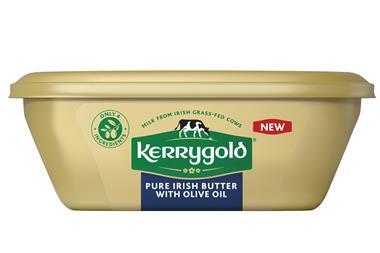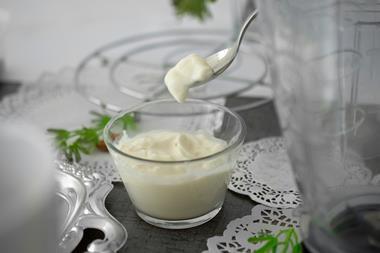CHEESE: GREAT CHEDDAR GORGE
Will price cutting in a mature market spoil attempts to grow the premium cheese sector?
asks Peter Crosskey
Say cheese and the UK consumer thinks of Cheddar. Number one in the £1.27billion UK retail cheese market, Cheddar dominates hard cheese sales with a 55% market share. But while volumes are static, value is decreasing, largely as a result of own label price cutting by the supermarkets and a decline in independent cheesemakers producing for the premium end of the market.
David Keig, commercial director for the 11-producer cooperative West Country Farmhouse Cheddars, which includes Denhay Farms, Keen's and Montgomery's, will unveil a dynamic new campaign later this summer aimed at cranking up sales of premium Cheddar through the multiples. It will develop the West Country Farmhouse Cheddar brand already used on prepacks in Waitrose and Budgens.
"By taking control of the premium end of the market, we aim to drive consumers to upgrade to our products, which will expand the category as a whole," says Keig.
Central to the strategy is the use of Protected Denomination of Origin (PDO) labelling which is governed by MAFF and guarantees traceability and authenticity.
"The term Farmhouse has been widely abused," says Keig. "We believe that the PDO mark, which will appear on all our new packs, is an appealing proposition, particularly when production methods are so high on the consumer's agenda.
"We are keen to educate consumers that our mature Cheddars are hand-made on farms which have animal welfare, strict hygiene controls and the production of good Cheddar at heart."
While the total spend on cheese has slipped by 2.5% year on year, business is still brisk at the prepacked cheese counter. The fixture continues to outstrip serveover sales by five to one at 222,167t for packaged cheese, compared to 45,359t for loose. Prepack commands a whopping 83% of the market in both value and volume.
Faced with such unequivocal consumer preference many of the larger independent creameries have bowed to demand for prepacked product. "Once a cheese is cut, it's lost its identity," maintains Neil Kenyon, md of Dew-Lay, which produces Cheddar and a number of territorial hard cheeses.
Nevertheless, the firm is cutting and packing at least 60% of its orders for retailers, whereas five years ago, almost all its sales were whole truckles to independent specialists.
Specialising in traditional Lancashire cheeses, production is being changed from 19kg cheeses to 10kg to satisfy supermarket demand for robust wedges on their pre-pack fixtures.
Here cheese is dominated by own label which represents 75% of the total cheese market by volume, and 72% of the value. Out of 19 top selling brands identified by Taylor Nelson Sofres, no less than 15 are own label. But Dairy Crest's mature Cheddar Cathedral City is giving them a run for their money.
The only branded English hard cheese, apart from Anchor, to feature in the super league, Cathedral City has enjoyed 80% growth in sales in the last year, largely driven by retailer price promotions, but it's soon to be supported with TV advertising, instore demos and POS material. There is also a programme of price-marked promotions planned, while the possibility of cross promotions are being discussed.
Elsewhere, producers and processors are working hard to raise the profile of their cheeses.
"This year we're offering consumers serving ideas rather than recipes," says Nigel White, secretary of the Stilton Cheese Makers' Association which is desperately trying to dispel the image of Stilton as a Christmas cheese.
"We want to persuade consumers that Stilton is a versatile product which can be used 12 months of the year," says White.
"We're using the line Add a little Oomph' in a new £400,000 campaign to get across the crumbly, creamy, tangy and dreamy words that consumers use to describe Stilton.
"It can be crumbled on top of salads like feta; it also goes well in sauces with chicken, not to mention soups. We need to tempt consumers to be more adventurous with it."
Although blue cheeses represent just 2% of the UK market, the Stilton Cheesemakers can take heart from the fact that sales of blue cheese are growing steadily.
Meanwhile, Dave Hardistry of North Downs Dairy, which selects and buys from farmhouse creameries in the West Country, is using a new handmade logo to differentiate his Pilgrims Choice Cheddar from the standard offer.
"It reminds customers of the authenticity of our product," says Hardistry. "With it, we have been able to give Pilgrims Choice a point of difference, as well as offer a range of flavour levels."
Flavour is also driving the Bradbury cheese factory's expansion in the autumn. It's building a £450,000 extension and bringing the making of additive cheeses in house.
"Our sales of combination cheeses have risen steadily since 1996," says md George Paul. With over 400 lines, the £20m a year business has moved to seven-day working, supplying the major multiples, specialist independents and food service customers.
Combination cheesemaker Ilchester is marrying French and British blues with its Somerset Blue. Layers of Cheddar are combined with Stilton and the French St Augur blue cheese.
It takes a long time to widen consumer horizons, but it can be done, and nowhere is that more marked than in imported soft cheeses.
"Consumption of goats' cheese and soft cheeses (excluding Brie and Camembert) is rising on both sides of the Channel," says Fine Cheeses from France spokeswoman Caroline Gaye.
Soft cheeses represent 16% of the market, worth just over £200m, and volumes sold to the UK rose by over a third last year, although conservative British tastes still put UK per capita consumption well behind the EU average of 16.8kg at 9.7kg. The French average is 23.6kg, so there's a long way to go, but French cheese imports are developing steadily, recording value growth of 4.4% last year, with volume gains of 2.9%.
Fine Cheeses from France is now in the second year of a campaign to raise the profile of French cheeses as a premium cooking ingredient. This year has already seen instore tastings in 100 British supermarkets, while negotiations are in progress with other multiples to schedule more tailor-made activity.
The French are analysing data on cheese usage from research carried out last month, with a view to raising the profile of their current recipe card activity which has so far been the main thrust of their campaign.
For foreign producers looking to add value in the UK market, managing the ripening process for retail customers is another option. The Isigny producer co-operative already does this with its AOC raw milk Camembert and Pont l'Evêque lines. For some of its Continental customers, it also supplies half, three quarter and fully ripened Camemberts. Mould ripened cheeses, such as Brie and Camembert, are already worth £33m in the UK.
But it's not just the French who are invading the cheese counters.
Once regarded as a speciality, Norwegian Jarlsberg cheese has gained mainstream status.
"Jarlsberg was once seen as a speciality cheese, but has since earned its place in every multiple and a growing number of independents," says specialist importer Bayham Foods md Peter Davies.
"Now that Jarlsberg is growing 10% year on year, we feel the time is right to promote other Norwegian cheeses. This year we are advertising Gjetost alongside Jarlsberg across a wide range of consumer titles."
Ski Queen Gjetost (pronounced yet-oast'), caramelised fudge-like cheese, is a standard item on breakfast tables all over Norway, where it is eaten in wafer thin slices on crispbread. Once a denizen of specialist cheese shops, it has earned a trial marketing period with a major multiple.
But the UK industry is fighting back against all the odds, it is also an exporter of fine cheeses.
Singleton's Dairy, the vertically integrated prepack cheese exporter, is investing over £1m in a new processing and packing plant to offer customers direct shipments.
"Despite a strong pound, growth in Euroland has developed exceptionally strongly," says export manager John Carr. "The next growth we are looking for is in premium prepackaged lines."
Unlike some of its competitors, the fact that Singleton's can control the product from milk to finished retail pack is an advantage.
"It inspires confidence that few exporters can offer," says Carr.
More than 1,500t of Singleton's product is shipped as far away as Japan and Australia.
McLelland's Seriously Strong brand has been registered in the USA, Canada, Australia and New Zealand. The firm will be exporting to these markets once agencies have been established.
{{FOCUS SPECIALS }}
Close menu
- Home
- Retail & Wholesale
-
Products & Suppliers
- Back to parent navigation item
- Products & Suppliers
-
Product Categories:
- Back to parent navigation item
- Product Categories:
- Alcoholic drinks
- Bakery
- Cereals & breakfast
- Cheese
- Chicken & poultry
- Chocolate
- Confectionery
- Crisps, nuts & snacks
- Dairy
- Fish
- Fresh produce
- Frozen
- Household
- Meat
- Own Label
- Sauces & condiments
- Seasonal
- Soft drinks
- Vaping
- Vegan & plant-based
- World foods
- Suppliers
- People
- Reports & Data
-
Topics A-Z
- Back to parent navigation item
- Topics A-Z
-
Popular topics:
- Back to parent navigation item
- Popular topics:
- Cost of living crisis
- Crime
- Deposit Return Schemes
- Finance
- Government & Regulation
- Health
- Inflation
- Loyalty
- Marketing
- Mergers & Acquisitions
- New Product Development
- Sourcing
- Supply chain
- Sustainability & environment
- Technology
- Ultra Processed Foods
- Vaping
- A-Z all topics
- Content by type:
- Events
- Ask iA (beta)
- Subscribe now
Sign in to comment on this article
Not logged in before? Register for FREE guest access today.
You will be able to:
- Read more stories
- Receive daily newsletters
- Comment on stories
Advert


















No comments yet